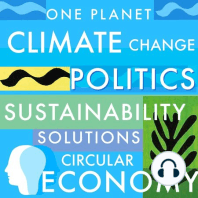20 min listen
Unavailable

Currently unavailable
(Highlights) YOLANDA KAKABADSE
Currently unavailable
(Highlights) YOLANDA KAKABADSE
ratings:
Length:
20 minutes
Released:
Mar 11, 2022
Format:
Podcast episode
Description
“I mentioned before that one of the reasons why we haven't been able to overcome many of the climate crisis factors is because people don't understand what it means. What is it about? What can I do? Usually, when we hear these experts speak about the climate crisis, at least me, I don't understand 9/10ths of the speech or the document. Simplifying the message, allowing that difficult scientific knowledge to become popular language that I can use when explaining to a child, to a rural person, to someone who has a different type of education, that knows much more about the planet but not necessarily about university, explaining those difficult issues will make a difference. And we have to invest much more in that. Speaking difficult scientific language is not helpful to the majority of society.Few are producers, all of us are consumers. So we all have to participate in how we produce, what we produce and that means from infrastructure for a city to the way that a road is designed or that a marketplace builds its operations. To do it in a responsible way, in a sustainable way, you need the contribution of all. I would say that it's one of the most difficult challenges that humanity has–addressing the urban problems. Basically, because you cannot change a city from one day to the other, but I think that the starting point has to be change the citizen. And being a citizen has a lot of implications because the moment you realize you are a citizen you also need to accept that you have to be active, that you have to be an agent of change. We cannot expect this city to change, if the citizens don't want to mobilize an agenda to push for something, to request changes, to participate. I think the word participation is absolutely key. And we find in Latin America and in all continents that very often we have governments that curtail the capacity of citizens to be active, that tell the population to wait for a change, to be passive, to let the government do their job. And that's absolutely wrong because government is the one that defines court, the game that the citizens are going to play. And that game is called defining the rules of the game and allowing the citizens to be active participants of change.” Yolanda Kakabadse’s work with the environmental conservation movement officially began in 1979, when she was appointed Executive Director of Fundación Natura in Quito, where she worked until 1990. In 1993, she created Fundacion Futuro Latinoamericano, an organization dedicated to promote the sustainable development of Latin America through conflict prevention and management. She was the Executive President until 2006 and remains as Chair of the Advisory Board. From 1990 until 1992, Yolanda Kakabadse coordinated the participation of civil society organizations for the United Nations Conference for Environment and Development (Earth Summit). From 1996 to 2004 she was President of the World Conservation Union (IUCN), President of the World Wide Fund for Nature (WWF) 2010-17, and Member of the Board of the World Resources Institute (WRI) during the same period. Yolanda was appointed Minister of Environment for the Republic of Ecuador, position she held from 1998 until 2000. She is a Member of the Board of Arabesque, and Chairs the Independent Science and Technology Panel of Fundacion Renova in Brazil. Yolanda is also a Member of the Board of Sistema B and the B Team.· World Conservation Union: www.iucn.org· WWF International: worldwildlife.org · Fundacion Futuro Latinoamericano: www.ffla.net/en/· Sistema B: sistemab.org· B Team: bteam.org · www.oneplanetpodcast.org· www.creativeprocess.info
Released:
Mar 11, 2022
Format:
Podcast episode
Titles in the series (100)
(Highlights) ROB BILOTT: Interviewed by Mia Funk & Dayana Gonzalez · Associate Podcast Producer Dayana Gonzalez by Sustainability, Climate Change, Renewable Energy, Politics, Activism, Biodiversity, Carbon Footprint, Wildlife, Regenerative Agriculture, Circular Economy, Extinction, Net-Zero · One Planet Podcast